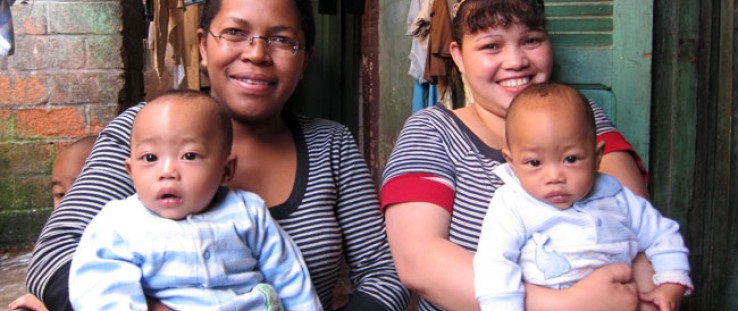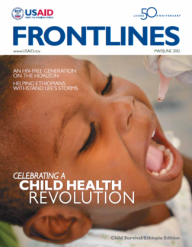 Odile Razafinganahary, right, holds one of her 5½ month old twins, Calist, while midwife Agnes Haingo holds Damas. The twins were safely delivered by Haingo in October 2011.
Susan Moffson, MCHIP
Odile Razafinganahary, right, holds one of her 5½ month old twins, Calist, while midwife Agnes Haingo holds Damas. The twins were safely delivered by Haingo in October 2011.
Susan Moffson, MCHIP
 Odile Razafinganahary, right, holds one of her 5½ month old twins, Calist, while midwife Agnes Haingo holds Damas. The twins were safely delivered by Haingo in October 2011.
Susan Moffson, MCHIP
Odile Razafinganahary, right, holds one of her 5½ month old twins, Calist, while midwife Agnes Haingo holds Damas. The twins were safely delivered by Haingo in October 2011.
Susan Moffson, MCHIP
Health Worker Article Series
Madagascar: Keeping Mothers Safe to Be Mothers
Kenya: Support from Clinic to Hospital to Home
Zambia: Coordinating Roles and Connecting with Care
Mozambique: Strength in Community Care
Bangladesh: Family Planning for Healthier Futures
Timor-Leste: Walking Together on the Long Road to Health
On Oct. 14, 2011, Odile Razafinganahary had just given birth to healthy twins in Itaosy, Madagascar, when midwife Agnes Haingo noticed that she was bleeding heavily. When two cotton cloths quickly became soaked with blood, the midwife knew she had to act immediately. After ensuring that no fragments of the placenta remained inside, Haingo began to massage the woman’s uterus. When the bleeding continued, she pressed firmly on Razafinganahary’s abdomen, over the aorta, to help stanch the bleeding. As she worked, Haingo explained to the 22-year-old what she was doing, keeping her informed and reassuring her so the new mother wouldn’t panic. After several minutes of compression, the bleeding finally stopped. Haingo learned the uterine massage and compression techniques last summer during a USAID-supported training.
The leading cause of death for women in Madagascar is postpartum hemorrhage. To reduce maternal and newborn mortality, the Maternal and Child Health Integrated Program (MCHIP), led by Johns Hopkins University affiliate Jhpiego through funding from USAID, has been training front-line health-care workers in basic emergency obstetric and newborn complications with a focus on preventing excessive bleeding after birth.
The MCHIP trainings focus on strengthening the interpersonal communication skills of doctors and midwives by continually reinforcing that they must always reassure the woman and describe what they are doing. Since September 2011, the program has trained 455 front-line health workers in Madagascar, reaching an estimated 20,000 women and newborns.









Comment
Make a general inquiry or suggest an improvement.